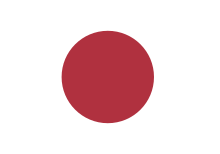| Japan at the 1992 Winter Paralympics | |
|---|---|
 | |
| IPC code | JPN |
| NPC | Japan Paralympic Committee |
| Website | www |
| in Tignes-Albertville | |
| Competitors | 15 |
| Medals Ranked 19th |
|
| Winter Paralympics appearances (overview) | |
Japan competed at the 1992 Winter Paralympics in Tignes/Albertville, France. 15 competitors from Japan won 2 medals, both bronze, and finished 19th in the medal table. [1]